Are you an almond mum?
Understanding the almond mum trend
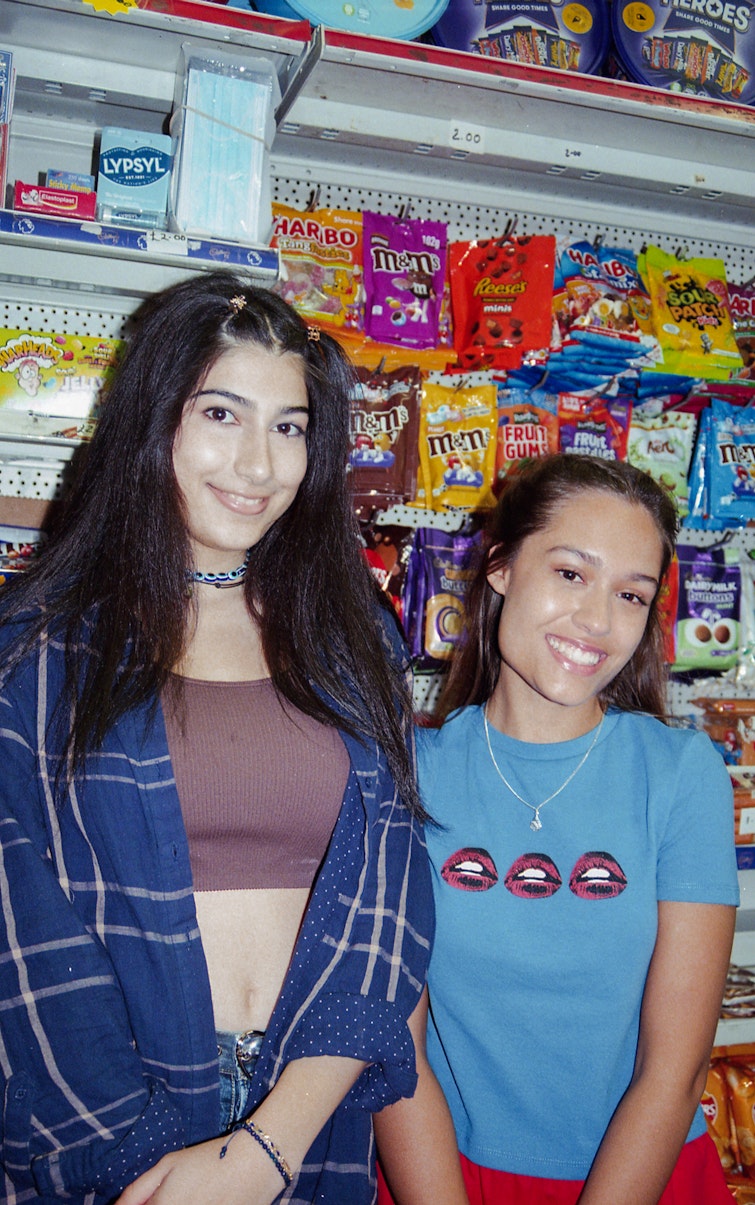
Updated November 20, 2025 • Medically reviewed by Dr. Emma Dickie
Medically reviewed by Dr. Emma DickieIn this article
Quick summary
- The "almond mum" trend highlights the effects of harmful comments from caregivers that promote toxic diet culture
- To avoid being an almond mum, it's best to encouraging balance over restriction when it comes to eating
- It's also important to role model body positivity or body neutrality – talking about health instead of weight, and being kind when you speak about yourself are both key factors within this

Here at luna we often talk about social media trends that teens themselves are trying out, such as salt water flushing, facial harmony or skin shedding.
But today, we want to explore a trend that’s actually centred around parents: the “almond mum”.
Understanding almond mum meaning
You may have heard the term “almond mum” being thrown around already, but what does it actually mean?
To put it simply: "almond mum" refers to a parent or caregiver who unintentionally promotes diet culture, subtly encouraging restrictive eating habits in the name of “health.”
The name itself comes from a viral video where a celebrity mum advised her daughter to "just eat a few almonds" when she felt hungry.
While it may sound like a light-hearted comment, it has sparked some important conversations around the messages we give our teens about food and body image.
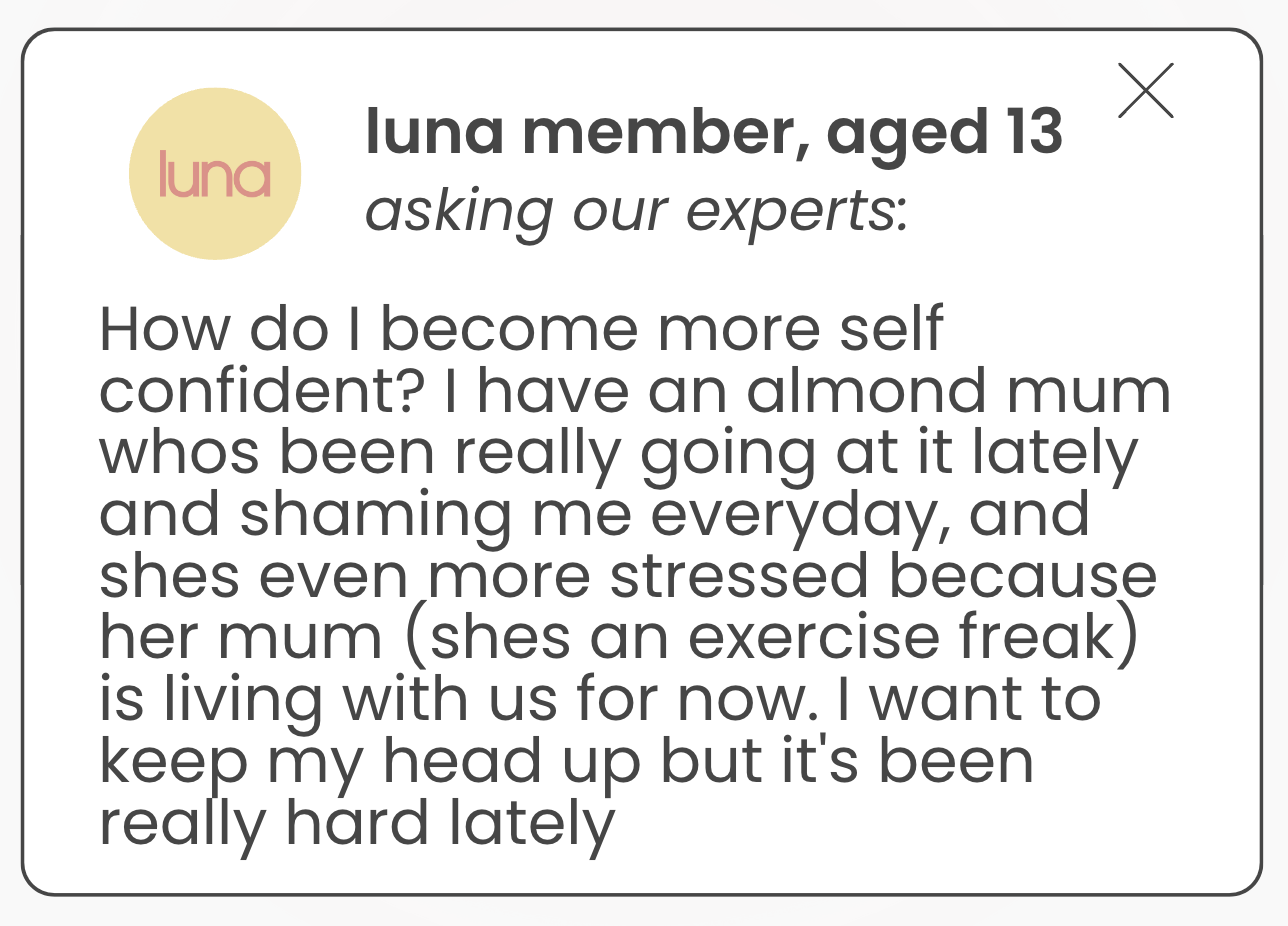
Why is it important to know about the “almond mum” trend?
Teens today are growing up in a digital world where they're constantly faced with images and filters that emphasise thinness and “clean eating.”
"What I eat in a day" videos garner millions of views – as of January 30, 2023, the hashtag #WhatIEatInADay has been viewed 15.1 billion times on TikTok.
And more recently, chubby and skinny filters have gained popularity on TikTok – a cruel and damaging trend which luna has spoken on in our chubby filter article if you'd like to understand the impacts of that.
These online messages about body image are also, at times, so subtle that they are easy for people to internalise without realising the harsh impact.
For example, rather than statements about weight loss and body shaming, teens may see “body check” videos and “slimming” filters (as mentioned earlier).
These subtle online messages can have a similar effect to the more obvious messages, and can cause low self-esteem.
You may yourself remember growing up with dramatic headlines and magazine covers which body shame celebs, and it can be easy to unintentionally echo these same ideas or anxieties, perhaps because we’ve internalised them ourselves over time.
Even though we may not want our teens to reflect our own insecurities and so do our best to disguise them, they’re often watching and listening more than we realise, and our relationship with food and our own bodies can deeply influence theirs.
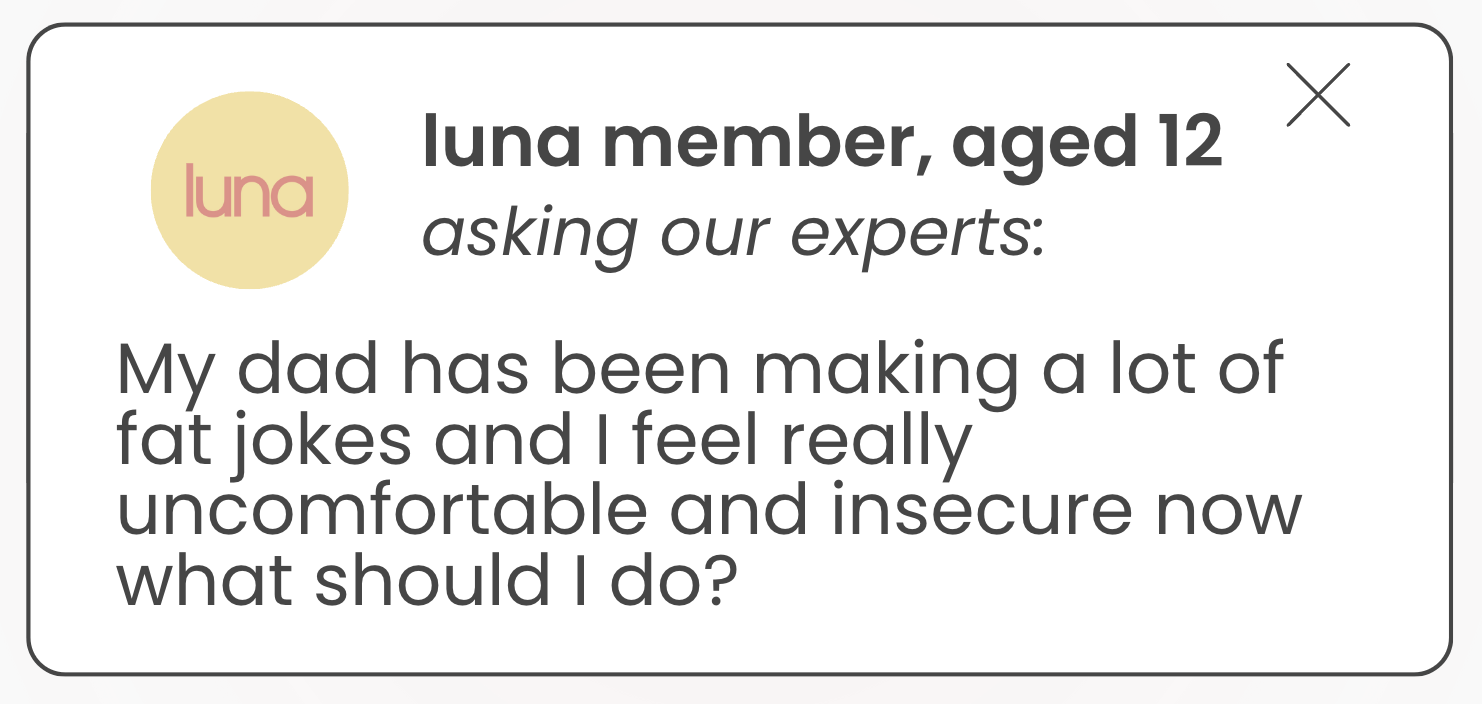
The “almond mum” approach vs. healthy habits
Parents who adopt an "almond mum" mindset often do so out of a genuine wish to be healthy.
However, it can lead to focusing too much on calorie control, restriction, and guilt around food.
This can lead your teen to associate eating with...
- Image
- Anxiety
- Control
But eating should be about nourishment.
Instead of adopting restrictive behaviours, it’s better to focus on balanced, non-restrictive eating habits.
According to the NHS, a healthy diet for teens is a balanced diet that involves eating nutritious foods that provide the energy and vitamins a body needs.
This is especially important during puberty and the teenage years.
There are five main food groups (carbohydrates, protein, dairy, fruit and veg, fats and oils) to familiarise yourself with.
Some healthy eating guidelines to follow
- We’re encouraged to eat 5 portions of fruit and vegetables a day
- Starchy carbohydrates (like wholegrain bread, rice, pasta and potatoes), which are filled with vitamins, minerals and fibre are also important
- Having some dairy and protein (meat, fish, pulses and beans) are key too as they help to keep your muscles, bones and skin healthy
- Foods high in sugar, salt and fat should be eaten less often and in smaller amounts as they’re generally not very nutritious
More on healthy eating for teen girls can be found here.
Are you an almond mum?
If you’re wondering whether you’ve unknowingly adopted some “almond mum” habits, ask yourself the following questions.
This isn’t about blame though or lecturing you though – everyone slips up!
It’s about awareness, and recognising where we might shift our approach to help our teens feel confident, nourished, and safe around food.
Ask yourself...
- Do I ever skip meals or tell my teen to “just drink water” when they say they’re hungry?
- Have I ever made comments like “are you sure you need seconds?” or “I wish I had your metabolism”?
- Do I find myself labelling food as “good” or “bad” – or feeling guilty about eating certain things?
- Am I always looking for the "healthier swap" for normal snacks (e.g., rice cakes instead of crisps)?
- Do I regularly talk about dieting, calorie counts, or portion control in front of my child?
- Is my pantry more of an “ingredients-only” zone with no “fun” snacks around?
- Have I encouraged my child to lose weight or made comments about their body, even subtly?
- Do I talk negatively about my own body in front of them – or complain about “needing to get back on track”?
- Am I often doing exercise with the goal of “earning” food – or making comments like “I need to burn this off” or "I've been bad this weekend, I need to have a punisher workout"
- Do I feel anxious or uncomfortable when my teen eats more than I think they should?
If the answers to all or most of these are yes, then don't worry and keep reading – we've got some advice that may help you.
How to not be an almond mom
While there's no doubt that you have your teen's best interests at heart, if they've called you an "almond mum" or hinted at the signs, it could be a clue that they're not receiving your intentions as you’d want them to.
In this case, you might need to think deeply about your relationship with food and eating and how you approach your child with this.
On top of a balanced diet, it can be helpful to think about our relationship with food and eating, and how we approach this with our child.
For example, comments that may be unhelpful are...
- “are you sure you need a second helping?”
- “I wish I could fit into my old jeans”
These might seem harmless, but they can plant seeds of self-doubt and insecurity in young minds.
These casual remarks can make teens feel like their worth is tied to their appearance or weight.
Whilst they aren’t about the food you’re putting on the table, they can be just as important to overall health and wellbeing.
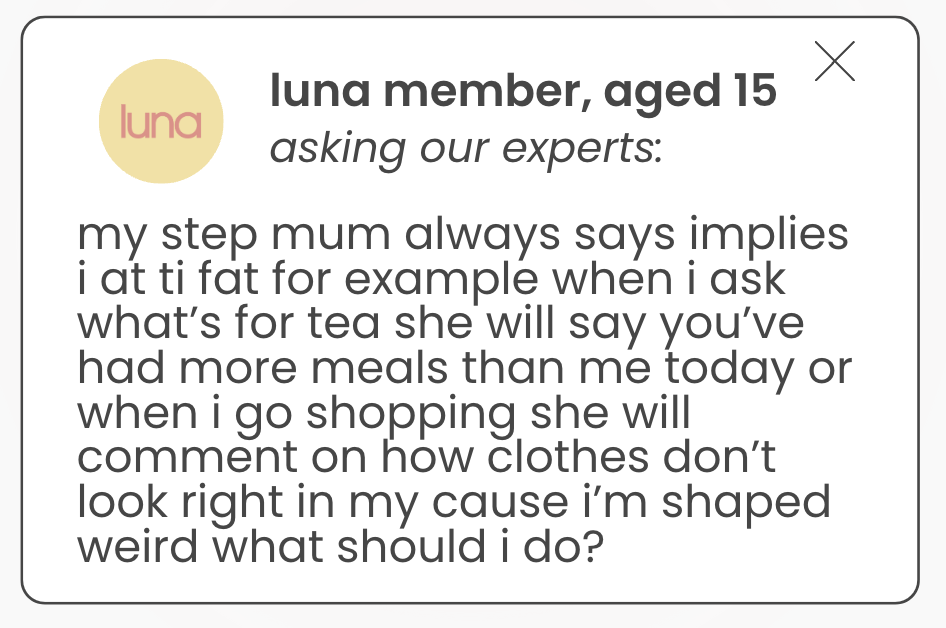
Here are a few ways to guide teens toward a healthy, balanced lifestyle without the pressures of diet culture and becoming an almond mum:
1. Model positive behaviour
It’s important to show your teen that all foods can be part of a healthy diet when consumed in moderation.
Avoid labelling foods as “good” or “bad” or saying things like “let’s be naughty and have a bar of chocolate”.
Instead, enjoy a variety of meals together as a family, and emphasise how different foods fuel our bodies for energy, growth, and overall happiness.
You may be pleased to know that a bar of chocolate is perfectly okay as a treat and you don’t need to feel guilty about this.
2. Talk about health, not weight
Weight gain is often expected when a teen is growing up and going through puberty.
So, we would never recommend a teen focuses on losing weight unless the teen is genuinely overweight. The NHS child BMI calculator can be a good rough guide to check this.
Even if a teen is overweight, instead of focusing on how food affects body shape or appearance, shift the conversation to how it makes us feel.
When a teen is not eating well, they may be:
- Low in energy
- Struggling with their moods
- Finding it difficult to concentrate
You could try to tell them about how eating healthier foods can help with this!
Encourage discussions about how certain foods make them feel and encourage them to lean into what makes them feel good in the long term.
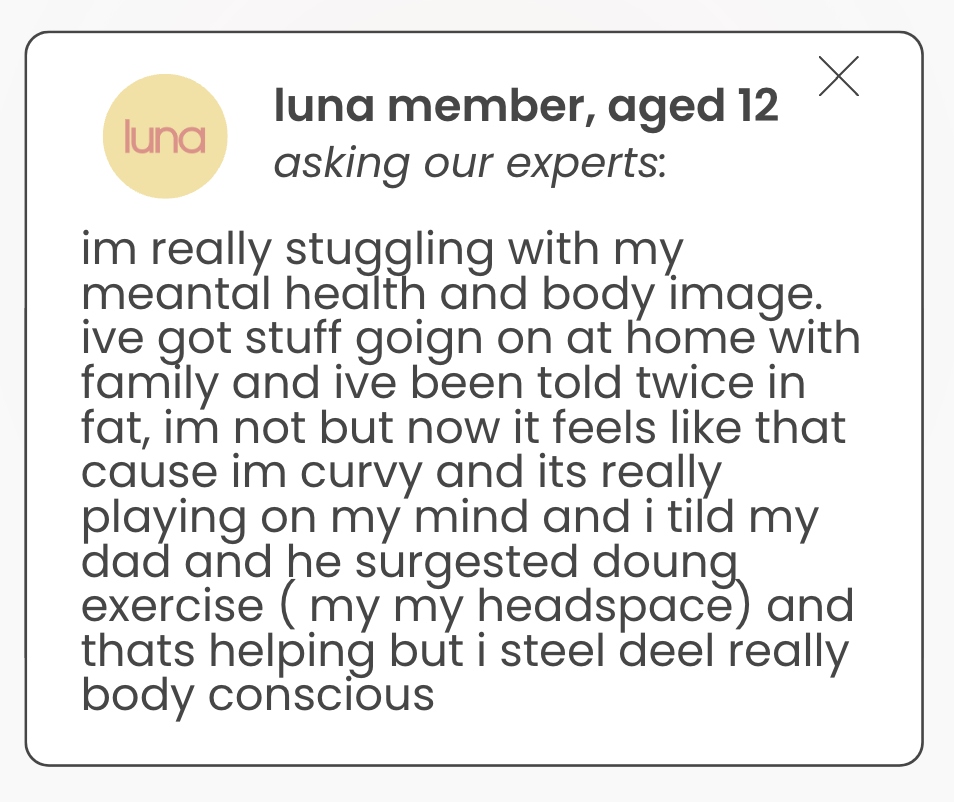
3. Encourage physical activity for fun
Make exercise about feeling good, not burning calories.
As long as your teens get about 60 minutes of moderate to intense activity a day, it doesn’t matter what they are doing!
Encourage them to find something they enjoy so it’s sustainable.
Some ideas to help your teen get active are:
- Dance classes
- Park runs
- Cycling
- Playing football
All you and your teen need to do is focus on finding a form of movement that your teen enjoys.
Physical activity should never feel like a punishment for eating or gaining weight.
We've also got a deep dive to help you learn about how to get your teen into exercise without being an almond mum.
4. Create a safe space
Be mindful of your own language around food and bodies.
It’s actually perfectly okay to admit if you’ve struggled with diet culture yourself – this can help open up a healthy conversation.
Your teen should feel safe to ask questions and express their thoughts without fear of judgement.
We know from the thousands of questions we’ve received about this in the luna app that body image and eating is one of the biggest concerns on teens’ minds.
5. Consult reliable sources
You can turn to a family doctor if you need personalised advice.
This is particularly in the case where your child is overweight or underweight according to the child BMI calculator.
A doctor can run some tests if needed and offer guidance.
If you are struggling with finding healthy options, the NHS offers clear, balanced advice on nutrition and physical activity.
luna also covers this in the app – all of the nutrition and exercise information on the luna app is verified by NHS doctors!

So, what can you take away from the almond mum trend?
It’s easy to see how, with the pressures of social media and constant images of unrealistic beauty standards, many parents (and teens) have internalised diet culture.
It can help to shift the focus from weight and restriction to...
- Moderation
- Enjoyment
- Wellbeing
By doing this, we can help our teens develop a healthy, lifelong relationship with food and their bodies.
It’s really not about being perfect – everyone slips up at times – it’s just about doing your best to create a positive and supportive environment where healthy habits can develop.
How we created this article:
luna's team of experts comprises GPs, Dermatologists, Safeguarding Leads and Junior Doctors as well as Medical Students with specialised interests in paediatric care, mental health and gynaecology. All articles are created by experts, and reviewed by a member of luna's senior review team.
Sources:
NHS "Physical activity guidelines for children and young people" | Accessed 27.03.25
https://www.nhs.uk/live-well/exercise/physical-activity-guidelines-children-and-young-people/NHS “Child BMI calculator" | Accessed 27.03.25
https://www.nhs.uk/health-assessment-tools/calculate-your-body-mass-index/calculate-bmi-for-children-teenagers/NHS "Healthy eating for teens" | Accessed 27.03.25
https://www.what0-18.nhs.uk/health-for-young-people/staying-healthy/healthy-eatingScience Direct "A reflexive thematic analysis of #WhatIEatInADay on TikTok" | Accessed 27.03.25
https://www.sciencedirect.com/science/article/abs/pii/S1471015323000594We'd love to keep in touch!
Sign up to our parent newsletter for emails on the latest teen trends, insights into our luna community and to keep up to date
By signing up, you are agreeing that we can use your email address to market to you. You can unsubscribe from marketing emails at any time by using the link in our emails. For more information, please review our privacy statement.